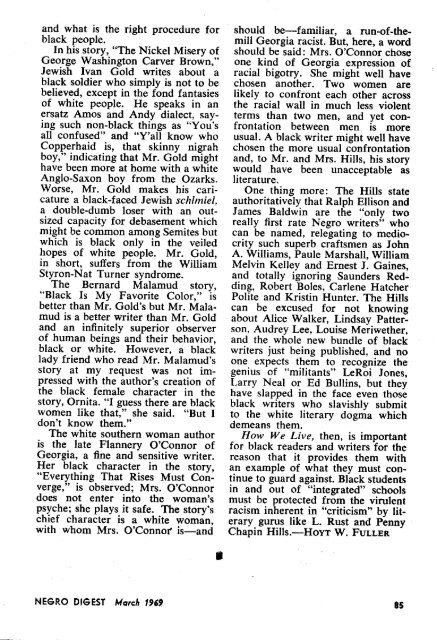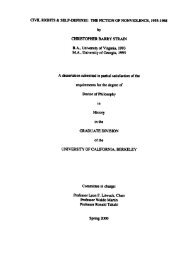Negro Digest - Freedom Archives
Negro Digest - Freedom Archives
Negro Digest - Freedom Archives
Create successful ePaper yourself
Turn your PDF publications into a flip-book with our unique Google optimized e-Paper software.
and what is the right procedure for<br />
black people.<br />
In his story, "The Nickel Misery of<br />
George Washington Carver Brown,"<br />
Jewish Ivan Gold writes about a<br />
black soldier who simply is not to be<br />
believed, except in the fond fantasies<br />
of white people . He speaks in an<br />
ersatz Amos and Andy dialect, saying<br />
such non-black things as "You's<br />
all confused" and "Y'all know who<br />
Copperhaid is, that skinny nigrah<br />
boy," indicating that Mr . Gold might<br />
have been more at home with a white<br />
Anglo-Saxon boy from the Ozarks .<br />
Worse, Mr . Gold makes his caricature<br />
a black-faced Jewish schlmiel,<br />
a double-dumb loser with an outsized<br />
capacity for debasement which<br />
might be common among Semites but<br />
which is black only in the veiled<br />
hopes of white people . Mr. Gold,<br />
in short, suffers from the William<br />
Styron-Nat Turner syndrome.<br />
The Bernard Malamud story,<br />
"Black Is My Favorite Color," is<br />
better than Mr. Gold's but Mr . Malamud<br />
is a better writer than Mr . Gold<br />
and an infinitely superior observer<br />
of human beings and their behavior,<br />
black or white . However, a black<br />
lady friend who read Mr. Malamud's<br />
story at my request was not impressed<br />
with the author's creation of<br />
the black female character in the<br />
story, Ornita . "I guess there are black<br />
women like that," she said . "But I<br />
don't know them ."<br />
The white southern woman author<br />
is the late Flannery O'Connor of<br />
Georgia, a fine and sensitive writer .<br />
Her black character in the story,<br />
"Everything That Rises Must Converge,"<br />
is observed ; Mrs . O'Connor<br />
does not enter into the woman's<br />
psyche ; she plays it safe . The story's<br />
chief character is a white woman,<br />
with whom Mrs . O'Connor' is-and<br />
NEGRO DIGEST March 1969<br />
should be-familiar, a run-of-themill<br />
Georgia racist . But, here, a word<br />
should be said : Mrs . O'Connor chose<br />
one kind of Georgia expression of<br />
racial bigotry . She might well have<br />
chosen another. Two women are<br />
likely to confront each other across<br />
the racial wall in much less violent<br />
terms than two men, and yet confrontation<br />
between men is more<br />
usual . A black writer might well have<br />
chosen the more usual confrontation<br />
and, to Mr . and Mrs . Hills, his story<br />
would have been unacceptable as<br />
literature .<br />
One thing more : The Hills state<br />
authoritatively that Ralph Ellison and<br />
James Baldwin are the "only two<br />
really first rate <strong>Negro</strong> writers" who<br />
can be named, relegating to mediocrity<br />
such superb craftsmen as John<br />
A . Williams, Paule Marshall, William<br />
Melvin Kelley and Ernest J. Games,<br />
and totally ignoring Saunders Redding,<br />
Robert Boles, Carlene Hatcher<br />
Polite and Kristin Hunter . The Hills<br />
can be excused for not knowing<br />
about Alice Walker, Lindsay Patterson,<br />
Audrey Lee, Louise Meriwether,<br />
and the whole new bundle of black<br />
writers just being published, and no<br />
one expects them to recognize the<br />
genius of "militants" LeRoi Jones,<br />
Larry Neal or Ed Bullins, but they<br />
have slapped in the face even those<br />
black writers who slavishly submit<br />
to the white literary dogma which<br />
demeans them.<br />
How We Live, then, is important<br />
for black readers and writers for the<br />
reason that it provides them with<br />
an example of what they must contime<br />
to guard against . Black students<br />
in and out of "integrated" schools<br />
must be protected from the virulent<br />
racism inherent in "criticism" by literary<br />
gurus like L. Rust and Penny<br />
Chapin Hills.-HOYT W . FULLER<br />
85
















